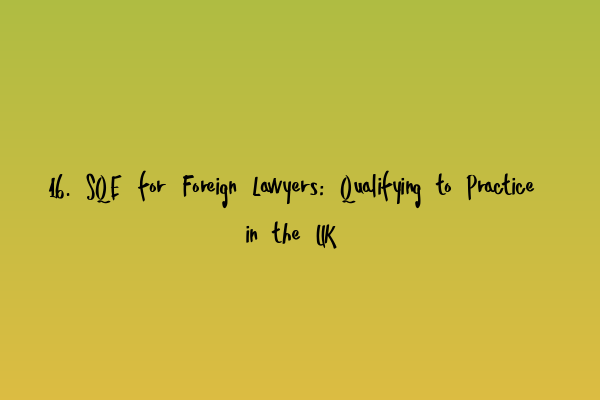16. SQE for Foreign Lawyers: Qualifying to Practice in the UK
The Solicitors Qualifying Examination (SQE) has opened up a new pathway for foreign lawyers who wish to practice in the UK. This new qualification system, introduced by the Solicitors Regulation Authority (SRA), provides foreign lawyers with the opportunity to demonstrate their legal knowledge and skills to qualify as solicitors in England and Wales.
For foreign lawyers considering the SQE, it’s important to understand the requirements, the structure of the exams, and how to prepare effectively. In this article, we will guide you through the process of qualifying as a solicitor in the UK as a foreign lawyer.
1. Understanding the SQE
The SQE is a two-part examination that tests both practical legal skills and legal knowledge. Part 1 consists of multiple-choice questions (MCQs) and is designed to assess your understanding of the foundational principles of law. Part 2 assesses your practical legal skills through a series of written and oral tasks.
As a foreign lawyer, you will need to pass both parts of the examination to qualify as a solicitor in the UK. It is important to note that the SQE is not an assessment of your ability to practice English law, but rather a measure of your understanding of the core legal principles and skills required to be a solicitor.
2. Eligibility Requirements
Foreign lawyers who wish to take the SQE must meet certain eligibility criteria set by the SRA. You must hold a qualifying law degree or have equivalent legal qualifications from another jurisdiction. If your qualifications are not recognized by the SRA, you may be required to undertake a process called ‘qualification recognition’ to have your qualifications assessed.
In addition to the educational requirements, you must also meet the character and suitability requirements set by the SRA. This involves disclosing any criminal convictions or regulatory findings you may have and providing evidence of your good character.
3. Preparing for the SQE
Preparation is key to success in the SQE. As a foreign lawyer, you may benefit from enrolling in a preparation course specifically designed for the SQE. These courses will help you familiarize yourself with the exam format, provide you with study materials, and offer practice exams to assess your progress.
MCQ Practice Exam Questions and Practice Mocks FLK1 FLK2 are valuable resources to test your knowledge and identify areas for improvement. Remember to dedicate sufficient time to revision and practice, as this will greatly enhance your chances of success.
4. SQE 1 Examination
The first part of the SQE focuses on legal knowledge and consists of two exams, SQE1.1 and SQE1.2. SQE1.1 tests your knowledge of business law and practice, dispute resolution, and contract law. SQE1.2 assesses your understanding of criminal law and practice, constitutional and administrative law, and tort law.
It is important to keep track of the SRA SQE Exam dates to ensure you meet the application deadlines and have ample time for preparation.
5. SQE 2 Examination
The second part of the SQE focuses on practical legal skills. SQE2 is divided into two assessments: the oral skills assessment and the written skills assessment.
The oral skills assessment requires you to demonstrate your communication and client interviewing skills in a simulated legal environment. This could involve interviewing a client, negotiating with other parties, or advising on legal matters.
The written skills assessment requires you to demonstrate your legal analysis, legal research, and drafting skills. You will be given various scenarios where you must provide written advice, draft legal documents, or analyze legal problems.
Preparing for the practical legal skills assessments may involve enrolling in SQE 2 preparation courses that provide guidance and practice materials to refine your skills.
6. Qualifying Work Experience
In addition to passing the SQE, you will need to complete a minimum of two years’ qualifying work experience (QWE) to qualify as a solicitor. QWE can be completed before, during, or after the SQE exams and can be gained in a variety of legal environments, such as law firms, in-house legal departments, or government legal departments.
It is important to plan your QWE early on and ensure that the work experience you undertake meets the SRA’s requirements. Your work experience must cover certain areas of law and involve activities that allow you to develop the necessary skills and competencies.
Conclusion
The SQE has opened up new opportunities for foreign lawyers who wish to practice in the UK. By understanding the requirements, preparing effectively, and gaining relevant work experience, foreign lawyers can qualify as solicitors and embark on a rewarding career in English law.
For further information about the SQE and to access valuable preparation resources, visit SQE 1 Preparation Courses and SQE 2 Preparation Courses provided by SQE Exam Law.
